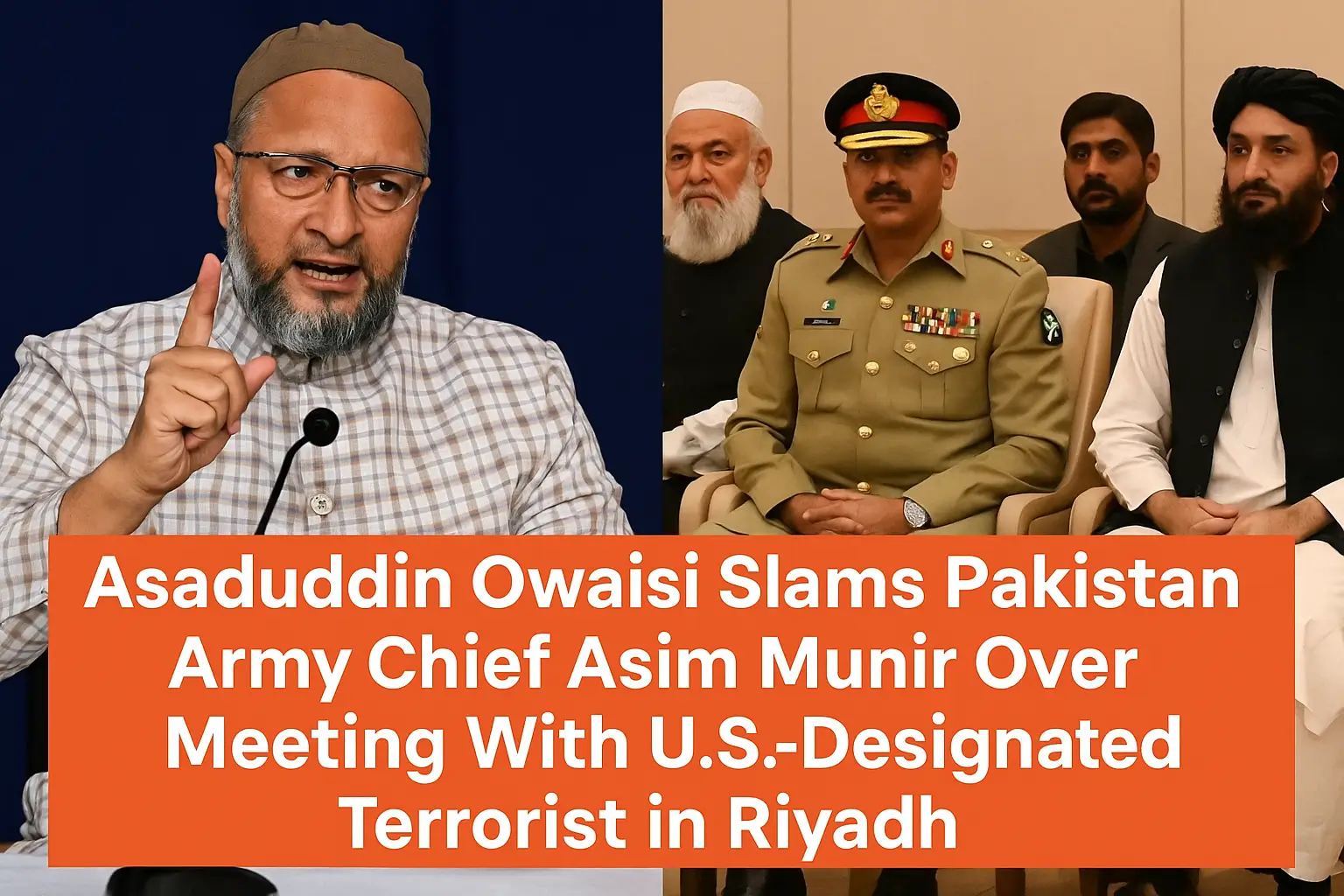In a bold and controversial speech delivered in Riyadh, AIMIM (All India Majlis-e-Ittehad-ul-Muslimeen) President and Hyderabad MP Asaduddin Owaisi targeted Pakistan Army Chief General Asim Munir for reportedly sharing a stage with a US-designated terrorist. The incident, which has sparked a fresh wave of political commentary and diplomatic discussions, is now making headlines across South Asia.
Owaisi Raises Eyebrows With Riyadh Speech
While attending a public event in Riyadh, Saudi Arabia, Asaduddin Owaisi strongly criticized the Pakistan establishment. Referring directly to General Asim Munir, the Chief of Army Staff of Pakistan, Owaisi questioned the military’s integrity and intentions in light of a widely-circulated image showing Munir sitting alongside a globally sanctioned terrorist.
In his address, Owaisi asked:
“Is this the real face of Pakistan’s ‘fight against terrorism’? A US-designated terrorist sitting next to the Army Chief of Pakistan – what message does that send to the world?”
Though Owaisi did not name the individual directly in his speech, political analysts and media outlets have inferred that the reference was likely to a leader of a proscribed group, possibly someone associated with Lashkar-e-Taiba or Jaish-e-Mohammed, both of which are banned organizations involved in terror-related activities and designated as such by the United States, the United Nations, and the European Union.
Who Is General Asim Munir?
General Asim Munir took over as Pakistan’s Chief of Army Staff in late 2022. Known for his intelligence background, Munir previously headed the Inter-Services Intelligence (ISI) and Military Intelligence (MI). His appointment marked a transition in Pakistan’s military leadership amid internal political instability and strained relations with former Prime Minister Imran Khan.
As Army Chief, Munir plays a key role not only in Pakistan’s defense policy but also in its internal security and foreign diplomacy. However, the latest controversy places his office under international scrutiny.
Who Was the Terrorist Seen With Munir?
While the name of the person seen sitting with General Munir has not been officially confirmed, security analysts suggest he is a US-designated global terrorist, someone previously known for leading or supporting radical Islamist factions operating in Kashmir, Afghanistan, and Pakistan.
Several media outlets in India and the West have speculated that the man may have links to Lashkar-e-Taiba (LeT), an organization responsible for multiple deadly attacks, including the 2008 Mumbai terror attacks. LeT founder Hafiz Saeed and its military commander Zakiur Rehman Lakhvi have been on the US’s terror list for over a decade.
Owaisi’s Stand Against Terrorism – and Pakistan
Asaduddin Owaisi, known for his vocal speeches and advocacy of Muslim rights in India, has often walked a fine line between challenging domestic government policies and condemning international acts of terror. Despite accusations from some quarters of being “soft on extremism,” Owaisi has consistently spoken against Pakistan’s state-sponsored terrorism and has firmly upheld India’s sovereignty.
In Riyadh, his remarks gained more attention as he spoke to a largely diaspora-based audience of Indian Muslims, emphasizing unity, patriotism, and peace. His rebuke of Pakistan’s military establishment is being interpreted as an attempt to distance Indian Muslims from extremist ideologies often attributed to Pakistan-based elements.
Political Reactions in India
Owaisi’s comments have drawn mixed reactions in India:
- BJP leaders praised his “bold stand” and said his statement proves that “even Indian Muslim leaders now reject Pakistan’s duplicity on terror.”
- Congress leaders remained cautious, choosing not to comment extensively but stating that Pakistan must act responsibly on international platforms.
- Owaisi’s own supporters hailed the speech as evidence that Indian Muslims do not support or identify with global terror networks.
Diplomatic Implications
This episode may have deeper diplomatic implications as it highlights ongoing global concerns about Pakistan’s links with terror groups. Although Pakistan has long denied these allegations, photos and videos of such interactions with designated terrorists often fuel allegations that Islamabad differentiates between ‘good terrorists’ and ‘bad terrorists’.
India has repeatedly raised the issue at UN forums, accusing Pakistan of harboring and promoting anti-India terror outfits. This incident, especially with its coverage in the Middle East, may influence how Gulf countries perceive their engagements with Pakistan.
U.S. and International Response
So far, no official comment has been made by the U.S. State Department or other Western intelligence agencies on this particular image or incident. However, if the man seen with Asim Munir is confirmed to be on any sanctions or terror list, Pakistan could face renewed international pressure, including monitoring by the FATF (Financial Action Task Force).
The U.S. has been vocal in its expectations from Pakistan to dismantle all terror infrastructures within its borders. In 2018, Pakistan was placed on the FATF grey list and only recently exited it after promising a series of financial reforms and counter-terrorism measures.

